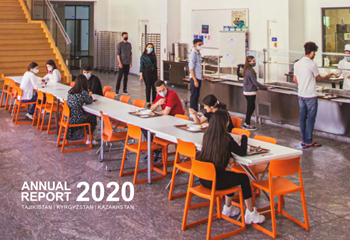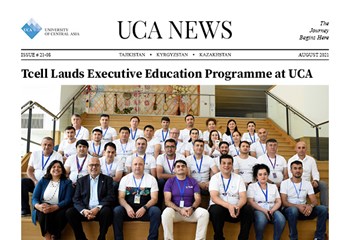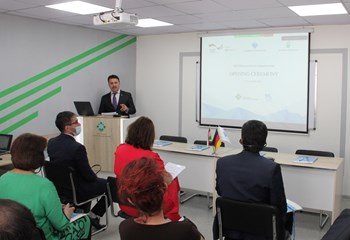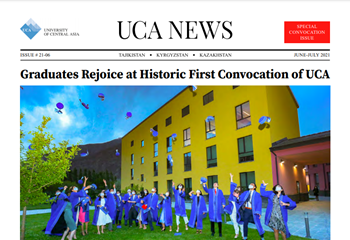
Fall 2021 Call for Participation: Live-Streamed Courses in Economics
The University of Central Asia's (UCA) Institute of Public Policy and Administration (IPPA), in cooperation with the Center for Economic Research and Graduate Education's Economics Institute (CERGE-EI) Foundation, invites all master level students, faculty members, applied researchers, and other interested individuals to participate in a live-streamed economics course starting in September- December 2021. Courses will be delivered online from CERGE-EI’s Digital Media Center in Prague, and coordinated by UCA from Kyrgyzstan and Kazakhstan to allow live streaming to multiple locations. Teaching Assistants from UCA will also provide basic assistance in course delivery.
Costs and Tuition Fees
Courses are offered free of charge to course participants.
Language
The language of instruction for all courses offered by the CERGE-EI Foundation is English. However, we allow for flexibility in using native language when delivering exercise sessions by local instructors.
Course Schedule
In Fall 2021, courses will be offered on International Trade, Energy Economics and Electricity Markets, Comparative Economic Systems, Innovation Economics and Applied Corporate Finance. All courses will be conducted in 6-week modules, with exams scheduled in the seventh week. Each week, there will be two 90-minute sessions (20 contact hours per course). All participants who successfully complete courses will be awarded CERGE-EI Foundation certificates.
Admission Requirements
The program is intensive and rigorous, advanced BA/introductory MA level of Economics knowledge is required. Participants should expect to be challenged and should be able to demonstrate self-motivation. UCA reserves the right to select only those applicants that it believes to have the necessary qualifications and experience to succeed. All courses will require the active participation of all students. Teachers will utilise modern technology to engage students, encourage their active involvement in the course work and class discussions.
Registration
The number of places is limited. To register for a course, please fill in the registration form until August 31st, 2021 following the link below:
Courses
Part 1: International Trade, Energy Economics and Electricity Markets, Labor Economics
International Trade
Brief description: This is a course about international trade, its determinants, and its consequences. We study the ways that the patterns of international trade might be shaped by (and might in turn re-shape) a country’s available resource endowments, its technology, the income distribution, economic growth, and politics.
The course starts with the concept of comparative advantage and the gains from trade and the determinants of the patterns of trade. We will further explore the costs, benefits, and impact on income distribution of different instruments of trade protection; the effects of free trade areas (trade creation and trade diversion), and of factor mobility. Students will learn to apply the analytical toolbox of trade theory to real world situations to make qualitative predictions of the effects of measures such as tariffs or export subsidies. Students will not only learn the theory, but they will have a chance to use and analyze actual trade data. We will also include the discussion of very relevant current issues (international supply chains, the use of network theory, effects of trade sanctions and embargoes).
Prerequisites: Microeconomics and Macroeconomics (at least an introductory course). If in doubt, please discuss your background with the main instructor.
Main Instructor: Vilém Semerák, Ph.D
Vilém Semerák is a researcher at the Economics Institute of the Czech Academy of Sciences and senior lecturer at the Institute of Economic Studies of Charles University (IES FSV UK) He graduated from the University of Economics, Prague (VŠE) and the Institute of Economic Studies of Charles University (IES FSV UK), studied at the London School of Economics and Political Science, and at CERGE, Charles University. He has worked on research projects in China (Shandong Economic University in Jinan, 2004-2005; East China Normal University in Shanghai, 2006, SIIS Shanghai, 2016), taught in Myanmar (University of Mandalay) and in other international projects. Currently he focuses on empirical trade analysis based on gravity models and input-output analysis.
Teaching assistant: Zalina Enikeeva
Zalina Enikeeva is a Research Fellow at UCA's Institute of Public Policy and Administration (IPPA). She holds MA in Economic Governance and Development from the OSCE Academy in Bishkek. Her expertise includes integration of the Eurasian Economic Union (EAEU), Belt and Road Initiative (BRI), international trade, food security, agricultural policies, tourism etc.
Dates: September 13 – October 22
Time: Tuesday & Thursday, 8:30-10:00 CEST
Energy Economics and Electricity Markets
Brief description: Energy is a basic necessity of daily life and a vital input to industry in any society around the world. Energy also plays a central role in climate policy.
The course, taking mostly the viewpoint of economic markets and economic regulation, aims at giving the student knowledge about various topics related to the energy system. The main focus will be on electricity and electricity markets, as a massive paradigmatic shift has been transforming electricity systems all over the world from centrally planned engineering systems to regulated markets over the past decade. This transformation is still underway and stirring up many new, important questions, such as the correct pricing of electricity and supporting services. A special focus is also on gas, a fuel playing a major role in electricity generation. Moreover, electricity is expected to play a special role in the decarbonatization effort of energy systems.
The course is focused on giving the tools to better understand and appraise the present policies regarding energy and electricity. Especially regarding investment in different kind of power plants, the use of the electricity grid and the possible support policies (such as capacity markets or renewable subsidies). Special attention is paid to the results of the energy policies in the energy change front runners such as California, Denmark, and Germany.
Prerequisites: Microeconomics and Macroeconomics at intermediate level
Lecturer: Silvester van Koten, Ph.D.
Silvester is an economist specializing in Economics Experiments and Energy Economics with a special interest in the economics of regulation, market design and energy markets. He holds a Ph.D. in economics (from CERGE-EI) and a MA in Psychology (Utrecht University). Presently, Silvester is a senior researcher at the Department of Economics at the Jan Evangelista Purkyně University, and a research associate at CERGE-EI in Prague. Silvester’s current research appraises the effect of the structure of spot market prices on the forward premium in electricity markets and the effectiveness of self-regulating organizations using theory, computer simulations and economics experiments. In previous research, Silvester analyzed the effects of more transparent financial markets on competition and prices in the EU electricity markets. His work was published in journals such as Energy Economics, Energy Policy, European Economic Review and the Journal of Regulatory Economics.
Teaching assistant: Madina Junussova, Ph.D.
Madina Junussova is a Senior Research Fellow at UCA's IPPA and a CERGE-EI Foundation Teaching Fellow. She has developed and taught Policy Processes, Methods of Policy Analysis, Policy Monitoring and Evaluation courses of UCA’s Executive Master in Economic Policy programme, which engaged civil servants from the Ministry of Finance, Afghanistan. Her research interests include policy analysis, policy monitoring and evaluation, efficacy of public investment, local and regional development, and sustainability. Madina holds a Ph.D. in Public Policy from Carleton University and degrees in architecture, urban and regional planning awarded by the Ministry of Education and Sciences of the Republic of Kazakhstan.
Dates: September 13 – October 22
Time: Wednesday & Friday, 9:30-11:00 CEST
Part 2: Comparative Economic Systems, Innovation Economics, Applied Corporate Finance
Comparative Economic Systems (Transition Economics)
Brief description: The course will introduce students to the economic functioning of centrally planned economies and the reasons behind their collapse. It will cover the main challenges the countries faced when transforming to market economies and analyze policies that were available and applied through the transition, such as privatization, macro stabilization, approaches to sectoral reallocation, etc. We will explore the advantages and disadvantages of the policies and assess how well they fitted the specific conditions of various countries. We will evaluate to what extent the transition was successful in achieving its goal to establish market economies and to what extent it is still a work in progress. Using this insight, we will try to understand the dynamics of current important economies with less textbook-like economic systems (China). We will use an interdisciplinary approach – i.e., to combine the introduction to selected institutional facts with relevant formal economic models and occasionally with an insight into quantitative methods which can be used on similar types of issues
Prerequisites: Microeconomics and Macroeconomics at intermediate level. If in doubt, please discuss your background with the lecturer
Main Instructor: Vilém Semerák, Ph.D., in cooperation with Krešimir Žigić, Ph.D
Krešimir has been the Citigroup Endowment Associate Professor with Tenure (under US permanent charter) at CERGE-EI since 2007 and a member of the Executive and Supervisory Committee of CERGE-EI since 2004. He has also been a Docent (Associate Professor) at CERGE, Charles University (previously an Assistant Professor since 1996), and a Senior Researcher at the Economics Institute of the Czech Academy of Sciences (previously a Researcher). He served as Deputy Director for Graduate Studies at CERGE and EI in 1997–1999, 2005–2008, and 2015–2017. He graduated from the Faculty of Economics at the University of Zagreb and received his Ph.D. in Economics at CERGE-EI. He was Philip Morris Associate Professor, Česká spořitelna Chair, and Altria Group Associate Professor. His work was published in many periodicals as Research in Economics, Economica, Journal of Economics, and more, as in books “Strategic Interactions and Policy Implications in Markets with Innovative Activity: The Cases of Strategic Trade and Market Leadership.
Teaching assistant: Elita Bakirova
Elita Bakirova is a Junior Research Fellow at UCA's IPPA. Prior to joining UCA, Elita worked for PeaceNexus Foundation in Central Asia, where she was responsible for projects that supported government and civil society actors in their development efforts. She was also engaged in gold mining and water management research projects in southern Kyrgyzstan. She holds a BA degree in International and Comparative Politics from the American University of Central Asia.
Dates: November 1 – December 10
Time: Tuesday & Thursday, 11:00-12:30 CET
Innovation Economics
Brief description: This course will cover selected topics on Economics of Innovation. It will help students to answer the most common questions about economic aspects of innovations: Why do firms innovate and why do they strive to be first in a race of research and development? How can employees be motivated to produce innovative outputs? How innovative ideas spread and foster creation of a new knowledge? How intellectual property of innovators is protected and what are the costs and scope of such protection? Where can innovative start-up firms get money to finance their projects? The contents of this course are based on insights from macro and microeconomics, contract theory and corporate finance. Previous knowledge in these subjects will be beneficial but is not required.
Prerequisites: Intermediate Microeconomics
Main instructor: Taras Hrendash, M.A., Ph.D. cand.
Taras received a B.Sc. and an M.Sc. in Finance from the Black Sea State University (BSSU) in 2011 and M.A. in Economics from CERGE-EI in 2015. He is a Ph.D. Candidate at CERGE-EI (Ph.D. expected in 2022) and Junior Researcher in economics of science, technology change and innovation at IDEA Think Tank. Taras has taught several economics courses, including Innovations and Entrepreneurship at CERGE-EI. His research interest include: geography of collaboration networks, clustering of innovation, accelerated examination of patents, aging of scientists, scientometrics, and gender homophily in science.
Teaching assistant: Baimat Niiazaliev
Baimat is a Junior Research Fellow at the Institute of Public Policy and Administration of the University of Central Asia. He holds MSc in Economic Analysis from the Corvinus University of Budapest in Hungary. His expertise includes agricultural economics, food security, and poverty.
Dates: November 1 – December 10
Time: Tuesday & Thursday, 9:00-10:30 CET
Applied Corporate Finance
Brief description: This course is aimed to establish a bridge between modern corporate finance theories and practical investment decisions in financial markets. We will cover the basics of agency theory, modern portfolio choice theory, assets-pricing models and their practical applications. After the course, students will be able to acquire and process the financial market data, to analyze the investment qualities of individual stocks and portfolios and to make rational investment decisions
Prerequisites: Microeconomics (Basic), Macroeconomics (Basic), Statistics (Probability Theory and Inferential Statistics)
Main instructor: Denis Aleeksev, M.A., Ph.D. cand.
Denis is a PhD student and Junior Researcher at CERGE-EI. He works as a Lecturer at the BRICS Institute of Irkutsk National Technical University (Russia). Denis holds MSc and PhD degrees in Finance from Baikal State University (Irkutsk, Russia). He is interested in financial markets and portfolio investments. His research is focused on the microeconomics factors of asset prices.
Teaching assistant: Mariia Iamshchikova
Mariia Iamshchikova, Junior Research Fellow at UCA's IPPA. She holds a BA in Economics from the American University of Central Asia. Her research field includes but not limited to the socio-economic development, food security and nutrition, and development economics.
Dates: November 1 – December 10
Time: Monday & Wednesday, 9:00-10:30 CET
About the University of Central Asia (UCA) and UCA's IPPA
The University of Central Asia (UCA) was founded in 2000 as a private, not for profit, secular university through an International Treaty signed by the Presidents of Kyrgyzstan, Tajikistan, and Kazakhstan, and His Highness the Aga Khan; ratified by their respective parliaments, and registered with the United Nations. As a university focused on the development of mountain societies, UCA's undergraduate programmes are located at its purpose-built world class residential campuses in Naryn, Kyrgyzstan, and Khorog, Tajikistan near the Tien Shan and Pamir mountains respectively. Established in 2011, UCA's Institute of Public Policy and Administration (IPPA) strengthens public policy making in Central Asia. It provides in-depth analysis of current and emerging policy issues facing the region, and works on improving the analytical capacity of governments and civil society to use evidence-based decision-making through professional development. IPPA is part of University of Central Asia’s Graduate School of Development.
About CERGE-EI and the CERGE-EI Foundation
The Center for Economic Research and Graduate Education (CERGE) was established in 1991 in the Czech Republic to offer a western-style PhD in Economics to students from the countries of Central and Eastern Europe and the former Soviet Union. It subsequently formed a joint workplace with the Economics Institute (EI) of the Czech Academy of Sciences. Today, CERGE-EI offers two additional master level programs: one-year long Masters in Applied Economics and two-years long Masters in Economic Research. All faculty are western-trained and CERGE-EI graduates receive degrees that are recognized in the EU and in the US. The CERGE-EI Foundation is a major financial supporter of CERGE-EI and, through its Teaching Fellows Program, supports western-trained economists teaching at universities across the region.











